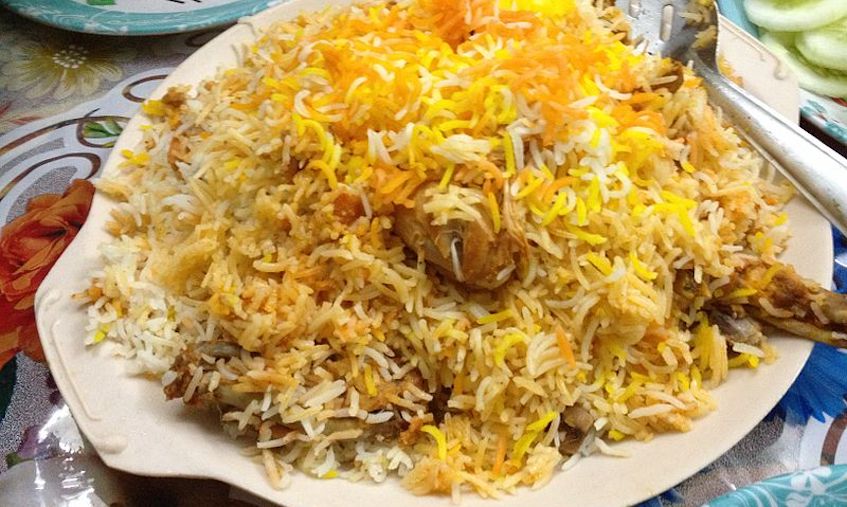Berhampur: A group of people describing themselves as ‘rationalists’ organised a community feast, serving chicken biryani here Tuesday to preach against what they termed as ‘blind belief’ that people should not cook or eat during a solar eclipse. As the solar eclipse set in Tuesday, their action sparked a debate between traditionalists who frown on the consumption of food during eclipses and rationalists.
The organisers of the feast here dismissed the practice as “superstition” and said it is neither wrong nor harmful for human beings to eat during a solar eclipse.
The Odisha government had declared a holiday on Tuesday in view of the eclipse and roads remained empty. Shops were closed for the most part of the day.
“It is all nonsense that people stop taking food during a solar eclipse. There is no bad effect on the body if one consumes cooked food, including non-vegetarian food during solar eclipse,” said Pratap Rath, a retired professor of Psychology at Utkal University is a 66-year-old man.
Rath, who is at present guiding research and is involved in empowering people with disabilities, claimed that he has been eating food during solar eclipses since childhood and is healthy.
Another rationalist Debendra Sutar, who is the editor of the science magazine ‘Baigyanika Charcha’, claimed that there is no scientific reason behind the traditional practice of fasting before and during a solar eclipse.
“They (traditionalists) claim that food will not be digested properly when there is no sun ray falling on the Earth. But don’t we consume food during the night when there is no sun at all? Only five to ten per cent of the people observe the traditional practice. So are the rest falling sick?” he asked.
Describing fasting during solar eclipses as “superstition”, he said, “There is no science behind remaining on an empty stomach before and during a solar eclipse”.
“If eating food during a solar eclipse is unhealthy, the government would have issued an advisory to the people as it does during summer to drink water and to use an umbrella in the sun.
The arguments of traditionalists are not based on science and so we do not believe in it,” said Bhalachandra Sarangi, a rationalist who was seen eating biryani.
Supporting the rationalists, Suvendu Pattnaik, the director of Pathani Samanta Planetarium here said “There is no impact on the human health for eating food during the solar eclipse. The people believe it since ages and it will go away with time. There is no point in opposing or supporting the belief”.
A solar eclipse is a celestial event that occurs when the moon passes between the sun and earth blocking the Sun rays from reaching the Earth, he added.
In Berhampur, the president of the Ganjam unit of the Humanist Rationalist Organisation E T Rao said, “We are trying to dispel the myths and superstition that eating during the eclipse is harmful”.
The district unit of the organisation arrange breakfast and lunch for people during solar and lunar eclipses and claimed about 2000 people ate their food there during the astronomical event during the day.
“We have seen that many people are now becoming aware of the superstition and science behind the celestial phenomenon. They are now coming forward to eat defying the age-old myths” said K Nandeshu Senapati, secretary of the organisation.
Satyanarayan Panda, an expert in Vedic practices, said “We are not opposing anyone who eats during the solar eclipse. Hindus worship the sun as God and as the origin of the universe. Therefore, at least for the sake of respect, I appeal to all to abide by the tradition”.
Though the solar eclipse is an astronomical event, it has mythological and astrological relevance in Indian culture, Panda said.
According to Hindu belief, the solar eclipse occurs when Rahu (one of the nine major celestial bodies or navagraha and the king of meteors), swallows the Sun god for the short time.
Pandit Suryanarayan Rathsharma of Puri said that the sun is the source of energy is admitted by science and by traditionalists and claimed that abstaining from food during solar eclipse is “purely scientific”.
“The Puranas say that there should be no food in the stomach during the solar eclipse. There may not be any immediate impact, but in the long run there may be issues of indigestion and stomach problems if one consumes food during it”, Rathsharma said.
All temples across Odisha were closed on the occasion of the solar eclipse and their rituals were conducted before morning as per the instructions of the Hindu almanacs, which had instructed that they be carried out before 4.57 a m.
In Odisha, the solar eclipse was visible from 4.56 PM and continued till 6.26 PM.
A report from Puri said that thousands of women ‘Habisyalis’ (women observing rituals in the Hindu month of Kartik) fasted on the occasion of the solar eclipse and visited the Sri Jagannath temple after it. ‘Kirtans’ were held in the pilgrim town and in mutts elsewhere during the eclipse.
PTI
